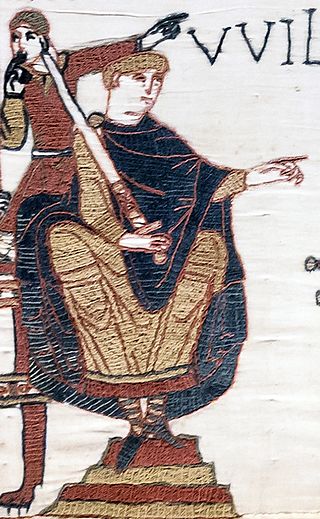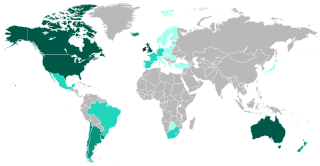
Anglo-Irish people denotes an ethnic, social and religious grouping who are mostly the descendants and successors of the English Protestant Ascendancy in Ireland. They mostly belong to the Anglican Church of Ireland, which was the established church of Ireland until 1871, or to a lesser extent one of the English dissenting churches, such as the Methodist church, though some were Roman Catholics. They often defined themselves as simply "British", and less frequently "Anglo-Irish", "Irish" or "English". Many became eminent as administrators in the British Empire and as senior army and naval officers since the Kingdom of England and Great Britain were in a real union with the Kingdom of Ireland for over a century, before politically uniting into the United Kingdom of Great Britain and Ireland in 1801.

William is a masculine given name of French origin. It became very popular in the English language after the Norman conquest of England in 1066, and remained so throughout the Middle Ages and into the modern era. It is sometimes abbreviated "Wm." Shortened familiar versions in English include Will, Wills, Willy, Willie, Liam, Bill, and Billy. A common Irish form is Liam. Scottish diminutives include Wull, Willie or Wullie. Female forms are Willa, Willemina, Wilma and Wilhelmina.

The Irish are an ethnic group and nation native to the island of Ireland, who share a common ancestry, history and culture. There have been humans in Ireland for about 33,000 years, and it has been continually inhabited for more than 10,000 years. For most of Ireland's recorded history, the Irish have been primarily a Gaelic people. From the 9th century, small numbers of Vikings settled in Ireland, becoming the Norse-Gaels. Anglo-Normans also conquered parts of Ireland in the 12th century, while England's 16th/17th century conquest and colonisation of Ireland brought many English and Lowland Scots to parts of the island, especially the north. Today, Ireland is made up of the Republic of Ireland and Northern Ireland. The people of Northern Ireland hold various national identities including Irish, British or some combination thereof.

Eustace, also rendered Eustis, is the rendition in English of two phonetically similar Greek given names:
Ancient and noble French family names, Jacques, Jacq, or James are believed to originate from the Middle Ages in the historic northwest Brittany region in France, and have since spread around the world over the centuries. To date, there are over one hundred identified noble families related to the surname by the Nobility & Gentry of Great Britain & Ireland.
Teng is a Chinese surname derived from State of Teng in the Western Zhou dynasty. It is the 73rd name on the Hundred Family Surnames poem. It is T'eng in Wade–Giles, Tàhng in Cantonese and is usually Romanized as "Tang" in Hong Kong. It is Têng in Hokkien and Teochew. It is "ddàng"in Wenzhou.
Borgman or Borgmann is an Anglo-Saxon and Frisian surname of Dutch, English, German (Germanic) name. It used to be the name given for landlords who worked for kings, royal aristocracy in the Middle Ages. They collected payments, therefore the Dutch name 'borg', to take toll/to take money, and 'man', the person who takes it. In this case this was the landlord. Parts includes Lower Saxony, Groningen, Gelderland, Overijssel, Drenthe, Friesland, Frisia and East Frisia and England.
The family name Whelan is an anglicisation of the Irish surname Ó Faoláin. The surname originates from the Middle Irish Úa Faeláin the name of the 10th to 11th century ruling dynasty of the Déisi, a population group inhabiting the area of the modern counties of Waterford and Kilkenny in the early medieval period.
Blennerhassett is an English surname.
Devereux is a Norman surname found frequently in Ireland, Wales, England and around the English-speaking world. Saint Devereux Church in Hereford, United Kingdom is also named Saint Dubricius and is dedicated to the 6th century clergyman Saint Dubricius from Hereford, suggesting that the name is a Norman French rendering of Dubricius or the saint's Welsh name Dyfrig. In Ireland, the name is associated with Wexford, where the Cambro-Normans first invaded from Pembrokeshire, Wales in 1170. Devereux is more probably the Anglo-Norman form of D'Evreux / Devreux, meaning d'Évreux. Anglo-Norman develops regularly a svarabakhti vowel /e/ between /v/ and /r/, such as in overi, or livere. Dubricius is called Dubrice in French and Dyfrig would have given *Difry / *Dufry in French and *Difery / *Dufery in Anglo-Norman, and St. Devereux is probably a mistranslation after the surname Devereux. The French variant is Devreux, which unlike Devereux is found within Normandy and France themselves.
The surname Giles or Gyles comes from the given name Giles. Bearers of this surname derive from the original followers of St Giles. They became a prominent family in the north-east of England in the mid 20th Century following their purchase of St Giles' Church and subsequently the founding of Gilesgate as a suburb of Durham.
Giles or Gyles is a masculine given name.
The surname Monaghan is a family name originating from the province of Connacht in Ireland. Mostly a last name.
Robb is a surname of Scottish origin, formed from a diminution (reduction) of the name Robert. Robert was a popular name, especially after its use by three Scots Kings in the fourteenth century. Rob is first recorded as a surname in the mid-15th century, with a handful of individuals recorded in the decades either side of 1500. As the 16th century progressed there were early groupings in Aberdeenshire, Lanarkshire and later in Perthshire/Stirlingshire. It is likely that the name originated with the offspring of a Robert or Rob, when surnames began to flourish, but unlike some surnames there is no one source for the name.
Flanagan is a common surname of Irish origin and an Anglicised version of the Irish name Ó Flannagáin which is derived from the word "flann" meaning 'red' or 'ruddy'.

Heron is a surname originating in the British Isles and Normandy during the Middle Ages.
Hely is both a given name and a surname. As a surname, it may be of English or Irish origin, either being a variant of Ely, Healey, or deriving from Irish Ó hÉilidhe / Ó hÉalaighthe.
Harland is both a surname and a given name. The name Harland is of Anglo-Saxon origins. It can be traced back to the Midlands as one of the earliest recorded surnames in the United Kingdom. Notable people with the name include:
Captain Giles Hovenden was an Anglo-Irish light horseman who served in Ireland c. 1532. Hovenden had come to Ireland from the Parish of Ulcomb in Kent, England. He was head of the Hovenden family and for his military service received estates in Queen's County. He also developed business contacts with leading Irish figures such as Conn O'Neill. He exercised guardianship over Hugh O'Neill, the second son of the assassinated Matthew O'Neill, 1st Baron Dungannon. Hugh eventually rose to become the Earl of Tyrone, the most powerful Gaelic lord in Ireland, best remembered for leading Tyrone's Rebellion and the later Flight of the Earls. Tyrone remained close to the Hovendens, employing three of Giles' sons as officers in the forces that the Crown allowed him to maintain.




